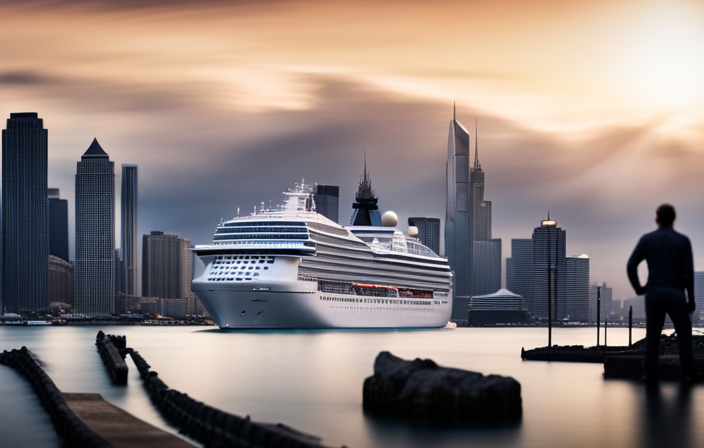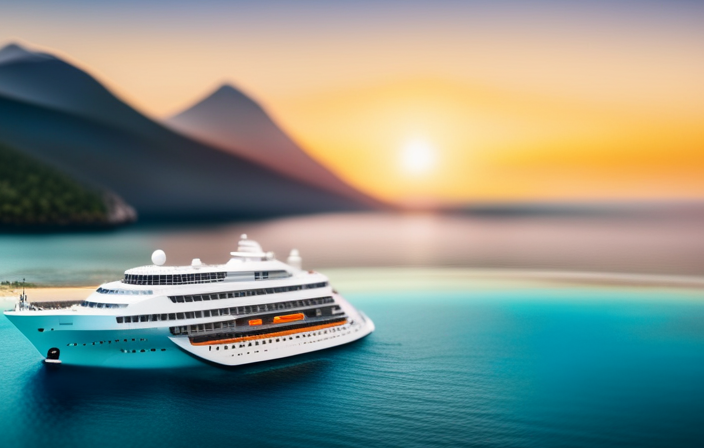Imagine this scenario: you are relaxing on the sun deck, feeling the soft sea breeze on your face as the ship smoothly sails through the crystal-clear waters. The laid-back ambiance of a cruise provides an ideal environment for enjoyment and relaxation. However, what steps should you follow if you unexpectedly become unwell?
It’s a situation nobody wants to imagine, but it’s important to be prepared. In this article, we’ll explore what happens if you get sick on a cruise and how the cruise lines handle medical emergencies.
From onboard medical facilities and staff to isolation and quarantine procedures, we’ll delve into the steps taken to ensure your well-being.
We’ll also discuss the vital communication between onboard medical professionals and onshore medical experts, as well as the 24/7 medical assistance available.
Additionally, we’ll explore passenger health practices, cruise line policies, and your responsibilities as a passenger.
So, let’s set sail on this informative journey and learn what happens if you get sick on a cruise.
Key Takeaways
- Passengers should take necessary precautions to prevent illness, such as frequent handwashing, using hand sanitizers, avoiding close contact with sick individuals, and properly disposing of waste.
- Cruise ships have sanitation protocols in place, including regular cleaning and disinfection of public areas, cabins, and dining facilities, as well as a focus on proper waste disposal.
- It is important for passengers to familiarize themselves with the cruise line’s policies and procedures, understand passenger health guidelines, and be aware of compensation options in case of illness.
- In the event of illness on board, passengers should notify the ship’s medical staff, cooperate with the crew, and ensure the best outcome for their health and safety.
Onboard Medical Facilities and Staff
If you start feeling unwell on a cruise, you’ll be relieved to know that there are onboard medical facilities and staff available to take care of you.
These onboard medical resources are equipped to handle a variety of medical emergencies that may arise during your trip.
The onboard medical staff consists of trained doctors and nurses who are experienced in providing medical care at sea. They are available around the clock to assist passengers in need.
The medical facilities are equipped with state-of-the-art equipment and medications to address a wide range of health concerns.
Whether it’s a minor illness or a more serious medical issue, the onboard medical team is prepared to provide initial assessment and treatment.
They will ensure that you receive the necessary care to help you get back on your feet and enjoy the rest of your cruise.
Initial Assessment and Treatment
When falling ill during a cruise, the first step is to quickly assess and treat the symptoms. Onboard medical care is readily available to address any health concerns that may arise. The ship’s medical facilities are equipped with trained staff who can provide initial assessment and treatment.
In case of an emergency, an onboard emergency response team is always prepared to handle critical situations. They are trained to respond swiftly and efficiently, ensuring the safety and well-being of passengers.
Whether it is a minor ailment or a more serious condition, the medical staff will provide appropriate care and treatment.
Now, moving on to isolation and quarantine procedures, the ship has protocols in place to prevent the spread of contagious illnesses among passengers and crew members.
Isolation and Quarantine Procedures
Additionally, the ship has strict isolation and quarantine procedures in place to contain contagious illnesses among passengers and crew members. If a passenger becomes sick on a cruise, they will be isolated in a designated area of the ship to prevent the spread of the illness. This area is equipped with medical supplies and staffed by trained medical professionals who follow specific isolation protocols.
Passengers in isolation receive necessary medical care and are closely monitored to ensure their well-being. In more severe cases, medical evacuations may be necessary to transport the individual to a shoreside medical facility for further treatment. These evacuations are coordinated with onshore medical professionals to ensure a seamless transition of care. Communication with onshore medical professionals is essential for the well-being of the sick passenger and to provide them with the appropriate medical attention they require.
Communication with Onshore Medical Professionals
To ensure your well-being during a cruise, it’s important to highlight that constant communication with onshore medical professionals is maintained throughout the journey. This allows for immediate assistance in case of illness or injury. However, there can be communication challenges and language barriers that need to be overcome. Cruise lines have protocols in place to address these issues and ensure effective communication between passengers and medical professionals. To facilitate communication, a two-way radio system is often used, allowing passengers to directly contact the medical team. In addition, some cruise lines have multilingual staff available to assist with language barriers. This ensures that passengers can accurately convey their symptoms and concerns to the medical professionals, leading to appropriate medical care. Overall, the cruise industry prioritizes the well-being of its passengers by providing efficient communication channels with onshore medical professionals. Transitioning into the next section about medical assistance, prompt access to medical professionals is crucial in ensuring the best possible medical care.
24/7 Medical Assistance
Get ready to experience top-notch medical assistance on your cruise journey, ensuring your well-being is taken care of every step of the way.
When it comes to onboard medical emergencies, cruise ships are equipped with medical professionals who are available 24/7 to provide prompt care.
In case of a serious medical condition, the ship’s medical team can arrange for a medical evacuation, which involves transferring the patient to a shoreside medical facility for further treatment. This ensures that you receive the necessary care in a timely manner.
Additionally, the ship’s medical facilities are well-equipped with state-of-the-art equipment and medications to handle a wide range of medical situations. From minor illnesses to more serious conditions, you can rest assured that you will receive the medical attention you need while onboard.
Speaking of medical expenses and insurance coverage…
Medical Expenses and Insurance Coverage
Medical expenses incurred during a cruise can be quite costly, especially if you require more extensive treatment or medical evacuation. That’s why it’s crucial to have adequate insurance coverage that includes medical evacuation and reimbursement claims. Medical evacuation, in particular, can be incredibly expensive, as it involves transporting you from the ship to a medical facility on land. Without insurance, you may be responsible for covering these expenses out of pocket.
Reimbursement claims will help offset the cost of medical treatments received onboard or in port. Therefore, it’s crucial to carefully review your insurance policy and ensure it provides sufficient coverage for potential medical emergencies.
With that in mind, let’s explore the next section about follow-up care and support.
Follow-up Care and Support
Finding adequate follow-up care and support after a medical emergency on a cruise is essential for ensuring your well-being and peace of mind. Here are three crucial aspects to consider:
-
Follow-up medical assistance: Once you disembark, it’s important to immediately seek medical assistance from onshore professionals. They can evaluate your condition, provide any necessary treatments, and offer guidance for your recovery.
-
Communication with onshore medical professionals: Staying in contact with the medical professionals who treated you onboard is crucial for ongoing care. They can provide guidance, answer any questions, and monitor your progress, ensuring that you receive the appropriate follow-up care.
-
Support from cruise staff and fellow passengers: The cruise staff can offer support by assisting with any necessary arrangements, such as transportation to medical facilities. Additionally, fellow passengers can provide emotional support during this challenging time.
Ensuring proper follow-up care, support, and communication with medical professionals are vital after a medical emergency on a cruise. This will help you recover effectively and transition smoothly into the subsequent section about passenger health and hygiene practices.
Passenger Health and Hygiene Practices
Passengers must prioritize their health and practice good hygiene measures to ensure a safe and enjoyable cruise experience.
Passenger illness prevention is crucial in maintaining a healthy onboard environment. It is important for passengers to wash their hands frequently with soap and water, especially before meals and after using the restroom. Additionally, using hand sanitizers that contain at least 60% alcohol can help kill germs.
Avoiding close contact with sick individuals and refraining from touching the face can also reduce the risk of getting sick.
Cruise ship sanitation is taken seriously by the crew, with regular cleaning and disinfection of public areas, cabins, and dining facilities. Passengers should also properly dispose of any used tissues or other waste to prevent the spread of germs.
By practicing these hygiene practices, passengers can contribute to a healthy cruise experience. Moving forward, it is important to understand the cruise line policies and procedures regarding illness prevention.
Cruise Line Policies and Procedures
To ensure a safe and healthy cruise experience, familiarize yourself with the cruise line’s policies and procedures. This will allow you to confidently navigate any illness prevention protocols that may be in place.
Cruise lines have specific guidelines in place regarding passenger health and compensation in case of illness. It is important to know your rights as a passenger if you get sick on a cruise. Most cruise lines have a medical facility on board, staffed with qualified medical professionals who can provide necessary treatment.
Additionally, cruise lines often have compensation policies in place to address any inconvenience caused by illness. These policies may include reimbursement for medical expenses, onboard credit, or future cruise discounts.
By understanding the cruise line’s policies and procedures, you can ensure that you are aware of your rights and take appropriate action in case of illness.
Now, let’s explore passenger responsibilities and precautions.
Passenger Responsibilities and Precautions
Make sure you take every precaution necessary to ensure your safety and well-being while on board the cruise ship. It is important to be aware of your responsibilities as a passenger and to follow any guidelines or recommendations provided by the cruise line.
In the event of an onboard medical emergency, it is crucial to notify the ship’s medical staff immediately. They are trained to handle various medical conditions and can provide the necessary care.
If the situation requires more advanced medical treatment, the cruise ship has medical evacuation procedures in place. This may involve transferring the patient to a nearby medical facility via helicopter or arranging for a medical team to board the ship.
It is essential to cooperate with the crew and follow their instructions during such situations to ensure the best possible outcome for your health and safety.
Frequently Asked Questions
How are medical emergencies handled during a cruise?
During a cruise, the onboard medical staff is responsible for handling medical emergencies. They are trained to provide necessary medical care and can initiate emergency evacuation procedures if needed to ensure the safety of passengers.
What types of medical equipment and facilities are available on board?
On board, there are medical staff available 24/7 to handle any emergencies. They have access to a range of medical equipment and facilities, ensuring prompt and efficient emergency response for passengers in need.
How are contagious illnesses prevented from spreading on a cruise ship?
To prevent the spread of contagious illnesses on a cruise ship, strict quarantine procedures are in place. Passengers undergo health screenings before boarding to identify any potential health risks and ensure a safe environment for all.
How are onshore medical professionals involved in treating sick passengers?
Onshore medical professionals are crucial in treating passengers during medical emergencies on a cruise. They provide immediate medical care, coordinate with the ship’s medical team, and arrange for necessary transportation and further treatment if required.
What are the procedures for handling medical emergencies that occur outside of regular working hours?
When handling medical emergencies outside of regular working hours on a cruise, procedures are in place to ensure prompt and efficient response. These may include an on-call medical team, emergency equipment, and coordination with onshore medical facilities.
Conclusion
In conclusion, if you happen to fall ill during a cruise, rest assured that there are onboard medical facilities and staff available to provide initial assessment and treatment.
In case of contagious diseases, isolation and quarantine procedures are put in place to prevent the spread of infections.
Cruise lines also have communication channels with onshore medical professionals for support and guidance.
Additionally, passengers can rely on 24/7 medical assistance and follow-up care.
It is important, however, for passengers to practice good health and hygiene practices and adhere to cruise line policies and procedures.










